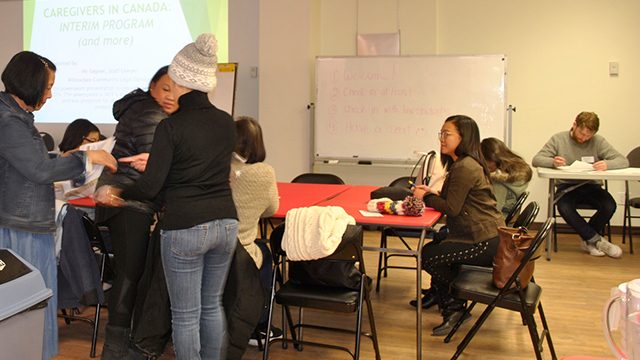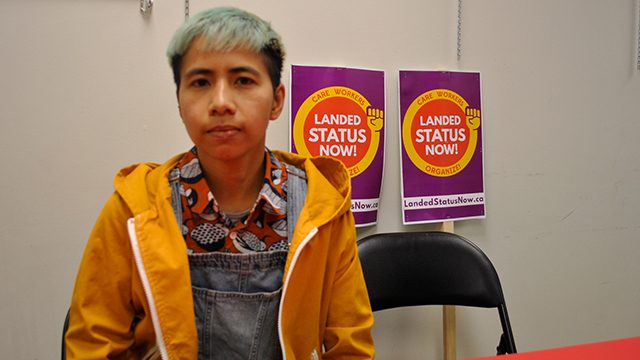SUMMARY
This is AI generated summarization, which may have errors. For context, always refer to the full article.

TORONTO, Canada – When Immigration Minister Ahmed Hussen announced two new 5-year caregiver immigration pilot projects and an interim pathway to permanent residency for care workers already in Canada on February 23, Jhoelyn Cruz said she didn’t know whether it was good news for her.
“I’m not sure what to do,” said Cruz in an interview shortly before she joined 50 other care workers who gathered Sunday, March 17, for an information session organized by the Caregivers’ Action Centre (CAC) about the Trudeau government’s new caregiver program.
Cruz, who arrived in 2016 under the Caring for Children Program stream, thinks she will meet the one-year work experience requirement and quite possibly, the language and education requirements to apply for the interim pathway to permanent residency.
What concerns her is that she only has until June 4 to submit the application. For someone who’s earning minimum wage and sending most of it back to family in the Philippines, 3 months is a short time to cough up thousands of dollars to pay for an application fee for her and her two dependents ($1,040 each), the cost of taking the language proficiency test (about $300), having her education assessed ($300-$2,000), getting a medical exam, plus other processing fees.
It’s also not enough time to go through the hoops of gathering her documents, having her education assessed and language proficiency tested.
But she worries that if she lets this opportunity pass, she may not get another chance. “There are so many factors to consider. I’m so stressed,” Cruz said.
The new program – intended to replace the current one set to expire in November – will assess whether care workers are eligible for permanent residency before they come to Canada. If deemed eligible, they can bring their children, spouse, or common-law partner to Canada and will be offered a “pathway to permanent residency” after two years of work experience.
The new program also gives care workers open work permits that will allow them to change employers quickly, unlike the current model which ties them to employers, making them vulnerable to abuse.
What Cruz and many others like her already here in Canada are wondering is whether these open work permits will also apply to them since they arrived under a different program. There are also unanswered questions about whether they can qualify under the new program.
“A lot of people are going to be left out,” said Kara Manso, who came to Canada as a caregiver in 2012 and now heads CAC.
She said aside from the huge financial burden, a number of care workers will be unable to meet the one-year work requirement for permanent residency under the interim pathway “because the system didn’t allow them to continue.”
This includes workers who lost their jobs for various reasons – for example, an employer died or their services were no longer needed – and may have found another job, but got stuck waiting for a Labour Market Impact Assessment (LMIA) that is required before a work permit can be issued. The typical waiting period for for an LMIA to be issued is 8 months, and for a work permit, 5 months.
Also excluded are workers who became undocumented because they lost jobs and were unable to find another employer who is willing not only to hire them, but also pay for the cost of the LMIA ($1,000). Some care workers have borne the cost of the LMIA in cases where an employer refuses to pay for them.

Uncertainty
Since the government has not laid out the criteria for the new program, it has raised a lot of uncertainty about who will qualify for it.
If the program maintains the permanent residency requirement of one-year Canadian post-secondary education equivalent and high levels of English language proficiency, it will “shut out migrants with fewer resources who have historically been able to come to Canada under [past] caregiver programs,” care worker groups have said.
“It’s really concerning because a lot of care workers are here and they are contributing to the country. They’re making sure that Canadian families are taken care of, but they don’t even know what’s going to happen to them,” Manso said. “We’ve been trying to make sure that no one is left behind.”
Aside from the uncertainty about the details of the new program, Manso said there are no assurances that they will be implemented since it hinges on whether Canada Prime Minister Justin Trudeau’s Liberal government will be reelected this October.
“Whatever happens in the election, we want to make sure the program will actually work for care workers,” she said.
The CAC and other migrant workers’ groups have launched an email campaign reiterating their call for the federal government to offer care workers landed status upon arrival.
“It’s only fair for us to have landed status upon arrival. We’re not asking for special treatment – just the same rights to be with our families and even for our work to be recognized,” Manso said. “We’ve contributed. We’re part of Canadian society and we should be treated fairly.”
The email, addressed to the immigration minister, also asks that undocumented care workers and those who have not finished 12 months of service be allowed to apply for permanent residence via the interim pathway.
“The new 2019 pilot program must not repeat the mistakes of the past. This means open work permits, no second medical, no high school English language test, and no requirement for one-year Canadian post-secondary education,” the email stated.
The email campaign also calls for the scrapping of a law denying permanent residence to an entire family if one of them has a disability.
It asks for an end to the backlog of 30,000 care workers waiting for a decision on their permanent residency, and 20,000 for family reunification. – Rappler.com
Add a comment
How does this make you feel?
There are no comments yet. Add your comment to start the conversation.